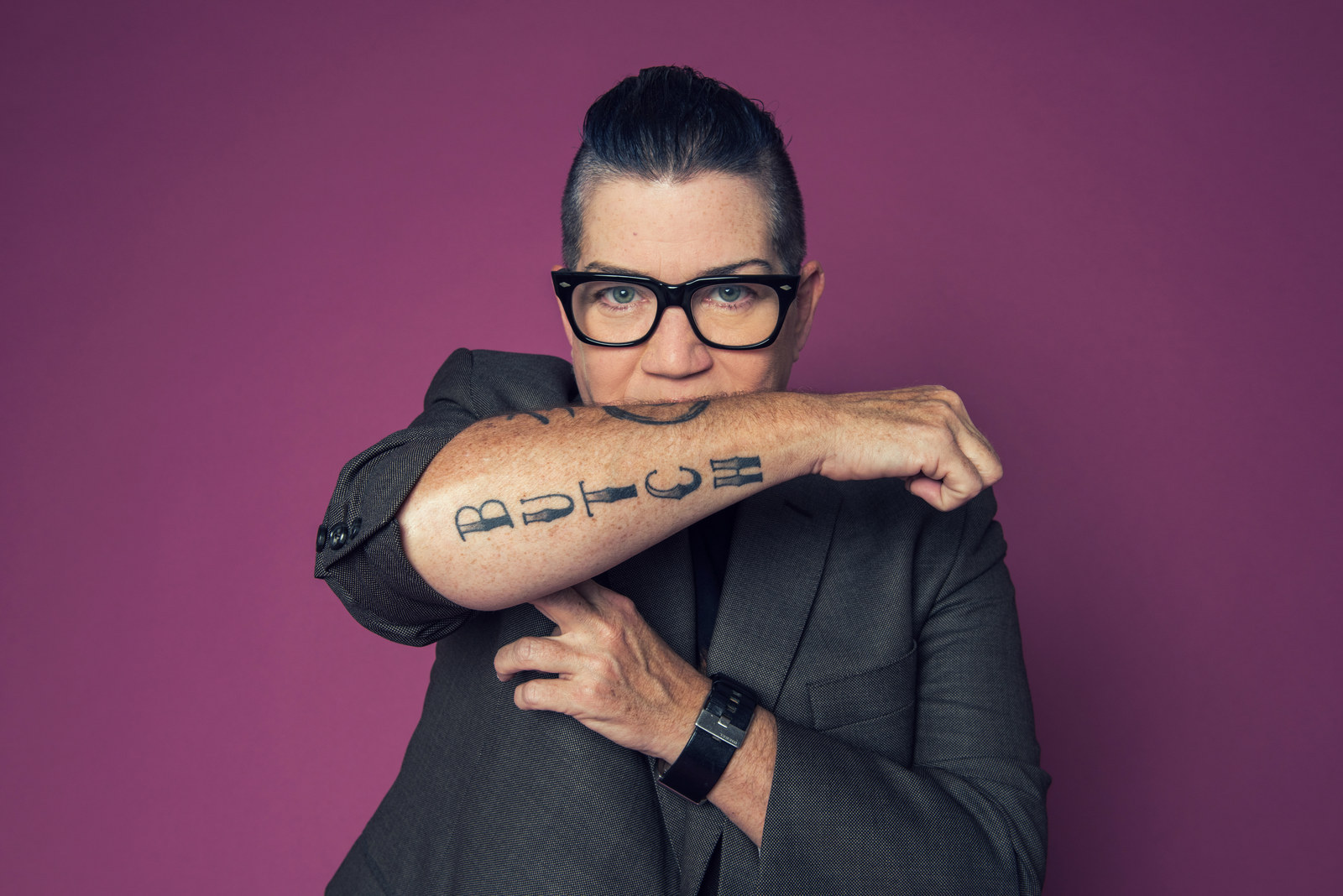You've seen Lea DeLaria as the hilarious, shit-talking, screwdriver-wielding Big Boo in Orange is the New Black — but did you know that DeLaria has been making major waves on stage and screen for over thirty years? The comic, jazz musician, and Broadway veteran — a true triple threat — stopped by BuzzFeed News to walk us through her career milestones, including her unyielding commitment to LGBT activism.
We of course have to start with your famous appearance on The Arsenio Hall Show in 1993, when you made headlines for being the first openly gay comic on late night. What were you thinking right before you went on?
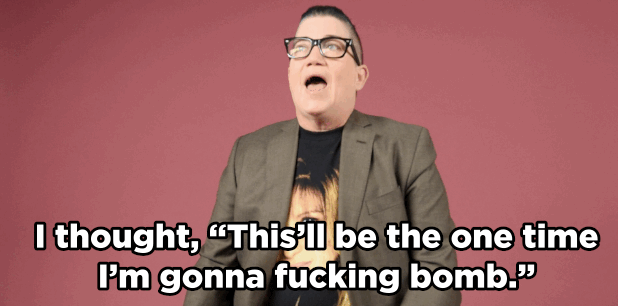
I was the first openly gay comic on television, period, in America — late night or daytime. I was the first. I walked out and said, "Hello everybody, it’s the 1990's, it’s hip to be queer and I’m a biiiiiiig dyke.”
I knew I was going to do that because I was doing similar stand-up at the time. I launched into different things that were happening socially around queers in the media. But right before I went on that night, I was terrified! That show was seen all over the world, not just America. And I was getting reports that apparently all these gay bars in LA and New York were watching, because they knew I was going to be on. I thought, "This’ll be the one time I’m gonna fucking bomb." I’m gonna walk out and say “It’s hip to be queer and I’m a big dyke” and there’s gonna be crickets, crickets, crickets. But instead, it was cheers. It was shocking to me because we hadn't packed the audience, we hadn’t done anything, but we just got the right audience, and they screamed at everything I said. I had to cut a couple jokes because the laughs were so long. It was awesome.
Your comedy career has spanned everything from touring musical comedies to one woman shows to traditional stand-up for over thirty years. How has your comedy evolved over time?
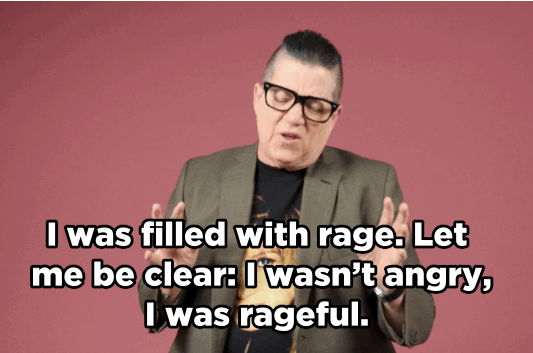

When I got started in San Francisco in 1982, I was filled with rage. Let me be clear: I wasn’t angry, I was rageful. 'Cause anger is a shitty little emotion. With rage, you can get stuff done. I was bald, I wore safety pins, I had big boots and tight tight pants. I was very punk at the time, just done and over it. I remember looking at Holly Near, which was a big lesbian thing at the time, and thinking this is the end of the fucking world, why is anyone listening to this shit? And that was basically what my comments and comedy were about: lesbian culture at the time.
I called myself the Fuckin’ Dyke. I wasn’t even Lea DeLaria. I wasn’t Lea DeLaria for the first two years as a comic. I was the Fuckin’ Dyke. It was like a persona. They’d say “Welcome to the stage, the Fuckin’ Dyke.” In 1982 in San Francisco, I couldn’t walk down the street without someone yelling “fucking dyke” at me. I thought if they’re gonna call me that, why not call myself that? I was really popular. I started [doing stand-up] in April 1982, and by September of the same year, I quit my day job — I had been working as a carpenter with an all gay construction crew — and was supporting myself solely as a stand-up comic. A year and a half after that, I had to start going by my own name, because honestly, everywhere I went in San Francisco I’d be walking down the street, and people would drive by in their cars and they’d scream “You fucking dyke!” and I didn’t know if they were a fan. I’d be with my girlfriend’s mother, and someone would scream “fucking dyke.” I had to go, I’m done now, I’ve gotta start being Lea DeLaria.


I think I was very loud, very fast, wouldn’t stop, in your face, boom boom boom. I think my comedy now is not — it’s still loud, still in your face, but I think now it’s a little smarter, and I talk about the world at large instead of just keeping it on what’s going on in queer culture. Of course I’m always going to have something to say about queer culture. But as gays have become more like the raisins in Raisin Bran, as my good friend Scott Thompson (who plays Buddy Cole) says, you don’t want the raisins all in one corner of the bowl. I feel like my job now is to comment more on society at large, rather than just focus on queers.
You’ve also had a successful Broadway career. What’s the most rewarding thing about performing on Broadway?
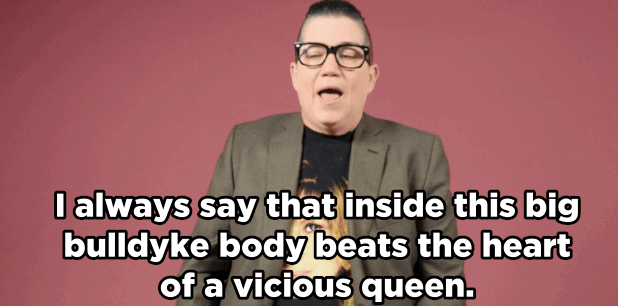
I am the happiest when I am downstage center belting a D sharp. There’s nothing that makes me happier. Whenever I do any kind of musical theater, whatever I do, I elicit a tremendous response from the audience. I’ve played Carnegie Hall many times, and almost every time, except once, I’ve stopped the show. And it’s really hard to do that at Carnegie Hall! I think it’s just that I loooove being there so much. I always say that inside this big bulldyke body beats the heart of a vicious queen. I love putting on a wig, and a dress, and heels, and just queening it up. Something about that makes me so happy. I love creating these actual real-girl characters, as much as I liked playing Eddie and Dr. Scott [in the 2000 revival of The Rocky Horror Show] — that was amazing. That they let a chick play Eddie was fantastic. Singing “Whatever Happened To Saturday Night,” getting hacked to death with a chainsaw — the audience would get so excited. I would come out, and I would look down, and I’d see people grabbing their playbills, trying to figure out if I was a man or a woman. They couldn’t tell!
I always love telling the story of Julie Harris coming backstage, coming up to talk to Alice Ripley and I — that’s the other reason I love Broadway, I get to share dressing rooms with people like Alice Ripley — so, she came in, and she was so charming and told me how funny I was as Dr. Scott, blah blah blah, it went on and on, and then she said “Now where’s that nice young man who played Eddie?” She was dead fuckin’ serious. Alice and I looked at each other and I said, “Um, I played Eddie, it was me.” She was like, “What???” I was like, yes, I just fooled one of the greatest actresses.
You’ve played a ton of supporting television roles over the years. Do you have a favorite?
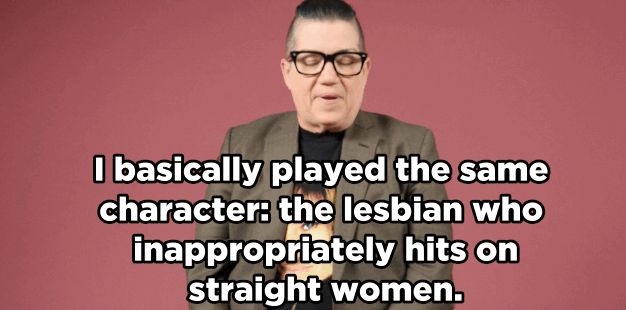
There's so many. For awhile, I basically played the same character: the lesbian who inappropriately hits on straight women. I did that a lot. Will and Grace really gave me… [playing] nurse Carver was ridiculous fun. I mean, it just was. As it was unfolding, they were throwing more jokes out to me, try this punchline, try this punchline. That was really fun.
The other one would have to be Matlock. That was my first work as an actor on television. Andy Griffith — to this day, I refer to him as my mentor. He was just a lovely and loving man, didn’t give a fuck about me being gay, and he just thought I was funny, so he wanted me on the show. Suddenly I had this recurring role on Matlock with Fred Sullivan and Andy fucking Griffith. [laughs] In one of the episodes my character was very klutzy, kept spilling things on a seersucker suit — that episode is in the Smithsonian, alongside that seersucker suit. So that’s kind of cool.
You’ve released various jazz recordings, including the most recent, House of David. Why did you decide to do jazz covers of David Bowie songs? And what’s your connection with Bowie?
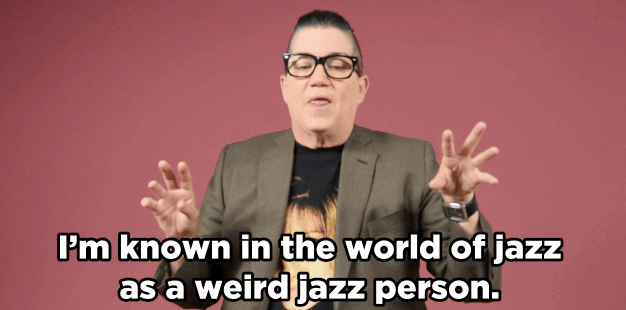
I was originally on the Warner Jazz label, I had five records out with them, and I’m known in the world of jazz as a weird jazz person. I don’t just sing the American songbook, I don’t just sing a tune that everyone knows. My first big hit in the jazz world was a swing version of The Ballad of Sweeney Todd. Everybody just went “What?” But it was great. For my second record, called Double Standards, I swung the college rock/alternative rock songbook. My two big hits were the smoky swing version of Blondie’s “Call Me”, that gets played all the time, and I did a really lovely jazz ballad of Neil Young’s “Philadelphia”, which also gets played all the time.
Doing that record absolutely put me in that place where I’m always looking for odd jazz. So when I was still on the label, before there was no Warner Jazz and Classics, I said it’d be fun to just do covers of David Bowie songs. They were like “What, why?” I was like, "Why? Are you fucking kidding me?” First of all, when have you ever heard anyone say “Oh, David Bowie, that hack?” Never. The man has been making hit records since the 1960’s. We’re talking about five decades of people who know David Bowie. Nobody under the age of 70 does not know David Bowie. His oeuvre is insane, it’s incredible number one hit after number one hit, and they’re all musically so interesting. Why wouldn’t I [do the record]?
But then the label went under, and I got Orange is the New Black, all this stuff happened, and I checked in with my producer who’s produced most of my records, and he brought up Kickstarter. I thought really, crowdfunding? Okay. And it worked. David Bowie started following me on Twitter, started putting all my stuff out. It’s been kind of amazing. House of David, Bowie plus DeLaria equals jazz, you can download it anywhere you download anything.
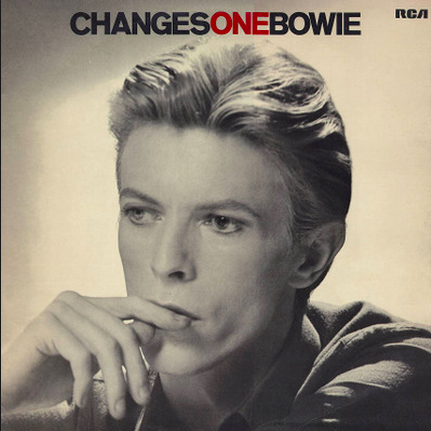
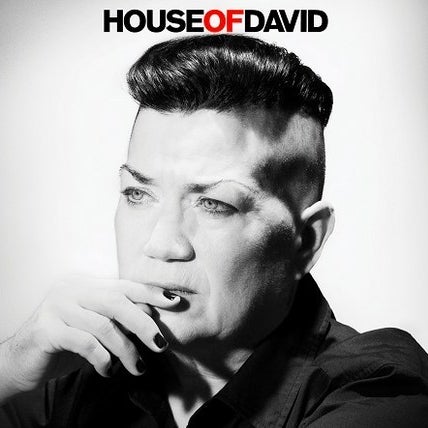
And, of course, you play Big Boo in Orange is the New Black. You got your own flashback episode in Season 3, where we see Boo struggling for acceptance from her father and grappling with butchphobia in the queer community. You’ve adopted “Refuse to be invisible,” a line from that episode, as a motto lately. What does it mean to you?
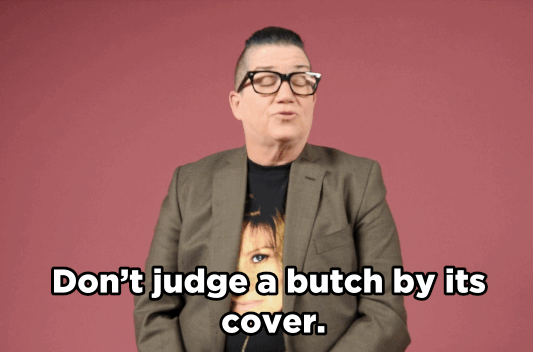

It’s pretty much about the entirety of my career: Don’t judge a butch by its cover. I wear the butch thing very proudly, obviously, I’ve got the tattoo. I live in a society that’s your basic heterosexist society, but also in the queer world where being butch is looked down upon. So refusing to be invisible — and I think you can apply that to almost anything — is important to effect change. It’s about accepting who you are, being who you are, and just putting yourself out there. It’s important. People loved it — that particular scene, with Boo and her father… I get hundreds of DMs every day on Instagram. I don’t think people realize that I look at those, but I do. I get tweets are about it, pictures, a meme started. I adopted the hashtag and I can’t believe how often it’s been used.
That brings us to your LGBT activism. You’re hosting the Ali Forney Center’s annual fall gala tonight, and you’ve participated in other queer activism throughout your career. What compelled you to get involved?
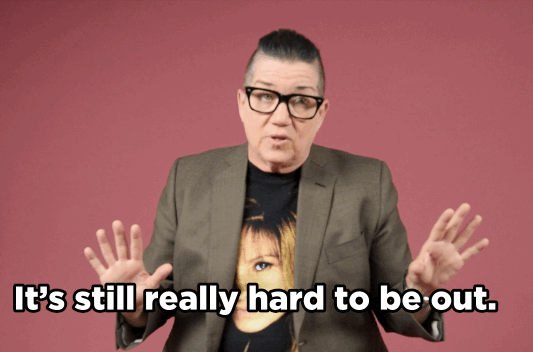

The same thing that compelled me to be an openly dyke comic, to be proud of my butchness, to be comfortable in my own skin, and to love myself the way I do. I grew up in a very different world that we had today, and it wasn’t that long ago that I grew up — you have to remember that. I grew up in the 70’s, and there was no one like me, ever, anywhere, period. Because Alison Bechdel [the author of Fun Home, a graphic novel-turned-musical] is of that same generation, that song “Ring of Keys” — I just really feel that song. I remember when I saw that butch for the first time. Such a great musical.
I knew that I would never be comfortable not being out. I knew that I had tools that would help effect change in the world. I could cower in the closet — I try really hard not to judge other people in this. It’s still really hard to be out. I hate to blame the person that’s not out in a society that’s a heterosexist society. It’s like blaming a woman for being raped because she’s wearing a sexy outfit — it’s bullshit. But for me, it would have been cowering in the closet, trying to become famous before coming out. I couldn’t ever do that, it just wasn’t me. I really prefer to look at myself in the mirror every day when I brush my teeth and like myself. Being true to who I am and what I am is just a huge part of it. The activism just went hand and hand.
I was out in 1982. When I started performing, they still called HIV and AIDS “gay cancer.” That was a very active time politically in the queer community, and I was in San Francisco, one of the hot spots. I wasn’t gonna be a dyke comic and not be part of the politics, part of the things we were trying to change, you know what I mean? That was it. After Arsenio Hall, that thrust me into world politics. I toured anywhere that spoke English, and a lot of places had never seen anything like that. So, yeah, once I was thrust into that world, please, why wouldn’t I?
Plus, it’s a great way to get laid, let’s be honest. I get a lot of pussy, always have.
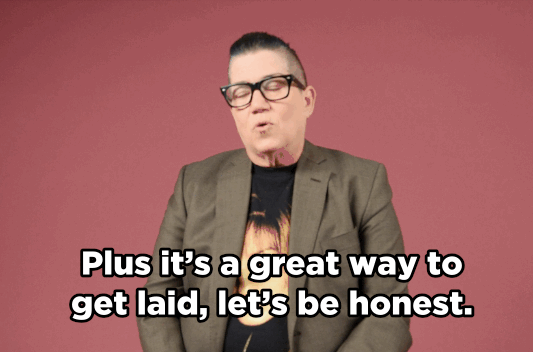

Find out more about the Ali Forney Center and their work with LGBT youth here.
This interview has been lightly edited for length and clarity.
